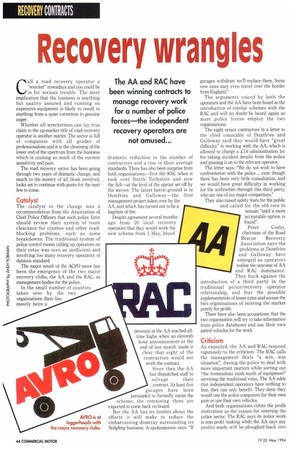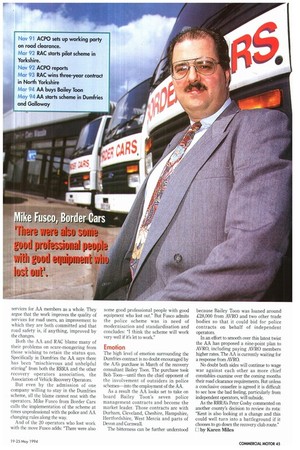Recovery wrangles
Page 46

Page 47

If you've noticed an error in this article please click here to report it so we can fix it.
The AA and RAC have been winning contracts to manage recovery work for a number of police forces—the independent recovery operators are not amused...
Call a road recovery operator a "wrecker" nowadays and you could be in for serious trouble. The mere implication that the business is anything but quality assured and running on expensive equipment is likely to result in
anything from a quiet coi 1 et;Lion to genuine anger.
Whether all wreckermen can lay true claim to the up-market title of road recovery operator is another matter. The sector is full of companies with all grades of professionalism and it is the cleansing of the lower end of the spectrum from the business which is causing so much of the current sensitivity and pain.
The road recovery sector has been going through two years of dramatic change, and much to the misery of all those involved, looks set to continue with gusto for the next few to come.
Catalyst
The catalyst to the change was a recommendation from the Association of Chief Police Officers that each police force should review their system of route clearance for crashes and other roadblocking problems, such as some breakdowns. The traditional system of police control rooms calling up operators on their rotas was seen as inefficient and involving too many recovery operators of dubious standard.
The major result of the ACPO move has been the emergence of the two major recovery clubs, the AA and the RAC, as management bodies for the police.
In the small number of counties taken over by the two organisations there has mostly been a dramatic reduction in the number of contractors and a rise in their average standards. There has also been surprise from both organisations—first the RAC when it took over North Yorkshire and now the AA—at the level of the uproar set off by the moves. The latest battle ground is in Dumfries and Galloway—the first management project taken over by the AA, and which has turned out to be a baptism of fire.
Despite agreement several months ago from 20 local recovery operators that they would work the new scheme from 1 May, blood pressure at the AA reached alltime highs when an eleventh hour announcement at the end of last month made it clear that eight of the contractors would not work the contract.
Since then the AA has dispatched staff to salvage their contract. At least five garages have been persuaded to formally rejoin the scheme; the remaining three are expected to come back on board.
But the AA has no doubts about the efforts it will make to reduce the embarrassing disarray surrounding its fledgling business. A spokesperson says: "If garages withdraw we'll replace them. Some new ones may even travel over the border from England."
The arguments voiced by both the operators and the AA have been heard at the introduction of similar schemes with the RAC and will no doubt be heard again as more police forces employ the two organisations.
The eight errant contractors in a letter to the chief constable of Dumfries and Galloway said they would have "great difficulty" in working with the AA, which is allowed to charge a £14 administration fee for taking incident details from the police and passing it on to the relevant operator.
The letter says: "We do not wish to have confrontation with the police ... even though there has been very little consultation, and we would have great difficulty in working for the authorities through this third party, who are one of our major competitors" They also raised safety fears for the public and called for the old rota to remain "until a more acceptable option is found".
Peter Cosby, chairman of the Road Rescue Recovery Association says the problems at Dumfries and Galloway have emerged as operators realise the outcome of AA and RAC dominance. They buck against the introduction of a third party in the traditional police/recovery operator relationship, and fear the possible implementation of lower rates and accuse the two organisations of entering the market purely for profit.
There have also been accusations that the two organisation will try to take information from police databases and use their own patrol vehicles for the work.
Criticism
As expected, the AA and RAC respond vigorously to the criticism. The RAC calls the management deals "a win, win situation", freeing the police to deal with more important matters while sorting out "the tremendous mish-mash of equipment" servicing the traditional rotas. The AA adds that independent operators have nothing to fear, they can only benefit. They deny they would use the police computers for their own gain or use their own vehicles.
And both organisations refute the profit motivation as the reason for entering the police sector. The RAC says its police work is non-profit making while the AA says any profits made will be ploughed back into services for AA members as a whole. They argue that the work improves the quality of services for road users, an improvement to which they are both committed and that road safety is, if anything, improved by the changes.
Both the AA and RAC blame many of their problems on scare-mongering from those wishing to retain the status quo. Specifically in Dumfries the AA says there has been "mischievous and unhelpful stirring" from both the RRRA and the other recovery operators association, the Association of Vehicle Recovery Operators.
But even by the admission of one company willing to stay in the Dumfries scheme, all the blame cannot rest with the operators. Mike Fusco from Border Cars calls the implementation of the scheme at times unprofessional with the police and AA changing rules along the way.
And of the 20 operators who lost work with the move Fusco adds: "There were also some good professional people with good equipment who lost out." But Fusco admits the police scheme was in need of modernisation and standardisation and concludes: "I think the scheme will work very well if it's let to work."
Emotion
The high level of emotion surrounding the Dumfries contract is no doubt encouraged by the AA's purchase in March of the recovery consultant Bailey Toon. The purchase took Bob loon—until then the chief opponent of the involvement of outsiders in police schemes—into the employment of the AA.
As a result the AA looks set to take on board Bailey Toon's seven police management contracts and become the market leader. Those contracts are with Durham, Cleveland, Cheshire, Hampshire, Hertfordshire, West Mercia and parts of Devon and Cornwall.
The bitterness can be further understood because Bailey loon was loaned around £28,000 from AVRO and two other trade bodies so that it could bid for police contracts on behalf of independent operators.
In an effort to smooth over this latest twist the AA has proposed a nine-point plan to AVRO, including paying AVRO members higher rates. The AA is currently waiting for a response from AVRO.
No doubt both sides will continue to wage war against each other as more chief constables examine over the coming months their road clearance requirements. But unless a conclusive ceasefire is agreed it is difficult to see how the bad feeling, particularly from independent operators, will subside.
As the RRRAS Peter Cosby commented on another county's decision to review its rota: "Kent is also looking at a change and this could well turn into a battleground if it chooses to go down the recovery club route." U by Karen Miles
































































































